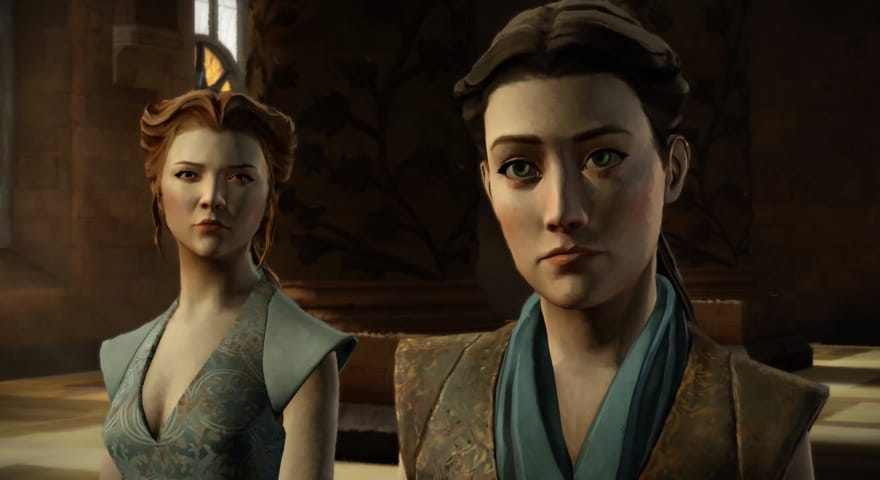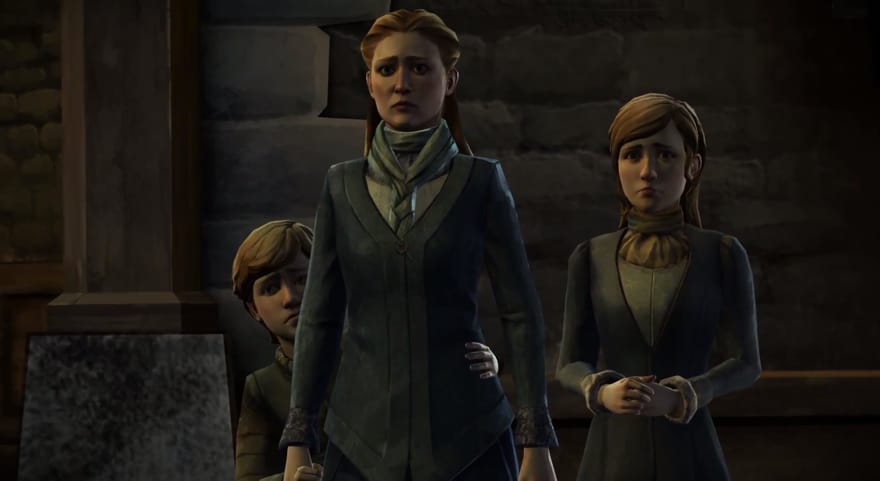The Red Wedding looms large in Telltale’s Game of Thrones

We’re all familiar with the Red Wedding, yes? Even if you haven’t watched the HBO TV show Game of Thrones, or read George RR Martin’s A Song of Ice and Fire book series, you probably know, in broad strokes, what the Red Wedding is. (Short version: everyone dies.) In the world of Westeros, the Red Wedding signaled a sea change in power and ethics that left what scraps remained of the virtuous, northern Stark clan dishonored, starving, and spread thin across the vast continent. For TV viewers, it boldly declared, “your favorite characters are never safe, and there is nothing you can do to help them.” Telltale’s new adventure game based on the show begins with the Red Wedding, showing the slaughter of House Stark’s loyal bannermen outside the castle at the same time the treacherous Freys are serving crossbow surprise in the dining hall.
Who lives and dies in Westeros has little to do with the measure of one’s character.
You begin in the role of Gared, a squire to the lord of House Forrester, loyal to the Starks, and thus the target of imminent sword points. However, before all hell breaks loose, you’re given a promotion by Lord Gregor Forrester, a chiding by a fellow squire, and are treated to several conversations where you select how you would like Gared to respond out of 4 dialogue options. In making these decisions, you help shape Gared into the kind of person you want him to be. It’s the same format that Telltale has been employing in their games since the first season of The Walking Dead a few years ago, but in this pre-Red Wedding instance, you’re motivated right off the bat to care if characters who “will remember that you were humble” or “took notice of your silence” actually live to see of what consequence those actions may have.

Plus, knowing those characters are in immediate danger, perhaps there’s something that can be said or done to shift the destiny of these relatively minor parties. It’s instinctive that you want the choices you make, even if there aren’t any “good” options, to bear some appropriate consequence. I told Ser so-and-so that his battle plan was garbage, so I expect a cold shoulder from him somewhere down the line. But, this being a Game of Thrones game, we should all really know better. This is only the first of six episodes, so it remains to be seen if those early dialogue choices will be of any impact, but regardless, who lives and dies in Westeros has little to do with the measure of one’s character. The Stranger comes for us all eventually, and not on our own terms—“Valar Morghulis,” as the game over screen, reminds us of this. We’re fated to play the hand that we’re dealt.
And in some ways, Telltale is just playing their hand, too. As far as television-to-videogame adaptations go, a dialogue-heavy adventure game set in the Game of Thrones universe is a perfect match for the show’s palace intrigue and gray-area characters, but it’s not without its caveats. For example, the inclusion of beloved characters and their corresponding actors from the TV show is bittersweet. Sure, it gives extra weight to the scene and the hitherto unknown Forresters to put them in conversation with Peter Dinklage and Lena Headey reprising their dastardly Lannister roles, but it also invites comparison to the actual TV show, which feels like an unattainably high bar for Telltale to reach.
At first I thought the Forresters just seemed like off-brand Starks
Similarly deflating, the game’s “painterly” visual style is often either too subtle to notice or too muddy to ignore, the wooden character animation is a poor substitute for live actors, and the writing is merely workmanlike, failing to tap into the rich vocabulary of Westeros as often or as eloquently as there is precedent in other media. Even when it comes to curse words, there’s such a rich tapestry of vulgar language in the TV show, it’s a crime to not rotate out a few F-bombs for something else every once in a while. Or perhaps these Forresters’ personalities are merely just as stiff as the Ironwood trees that surround them.

But even Telltale’s perceived failings at matching the most expensive television show of all time on production values are at least partially earned back by choose-your-own-adventure brand of interactive storytelling that accurately portrays the delicate balance between characters’ many strained relationships and conflicting values. In this first episode, you take turns controlling 3 different Forresters in 3 different settings, which provides more room for experimenting with varied roles instead of compelling players to project themselves onto a singular protagonist. I played the young Ethan Forrester as a semi-ignorant, yet confident boy-lord who only asks for help in private conversations, but I played Mira Forrester as a Sansa Stark analogue: respectful of her superiors at court, secretly loyal to her northern family, and a bit snooty with castle servants. At first I thought the Forresters just seemed like off-brand Starks, but in drawing those parallels, Telltale actually provides guideposts for how otherwise unfamiliar characters might behave in certain situations. Not sure who Ethan should solicit for counsel? Well, what would Bran Stark do?
While Telltale’s Game of Thrones may not be quite as epic in scope as the HBO show or Martin’s books, it comes off as a focused deep dive into what’s happening in some of the more minor houses while other self-declared kings and queens battle for the Iron Throne. And to its credit, the game does have at least one good shocking moment to keep you on your toes going into episode two, just don’t expect a new “Red Wedding”—at least not yet.



